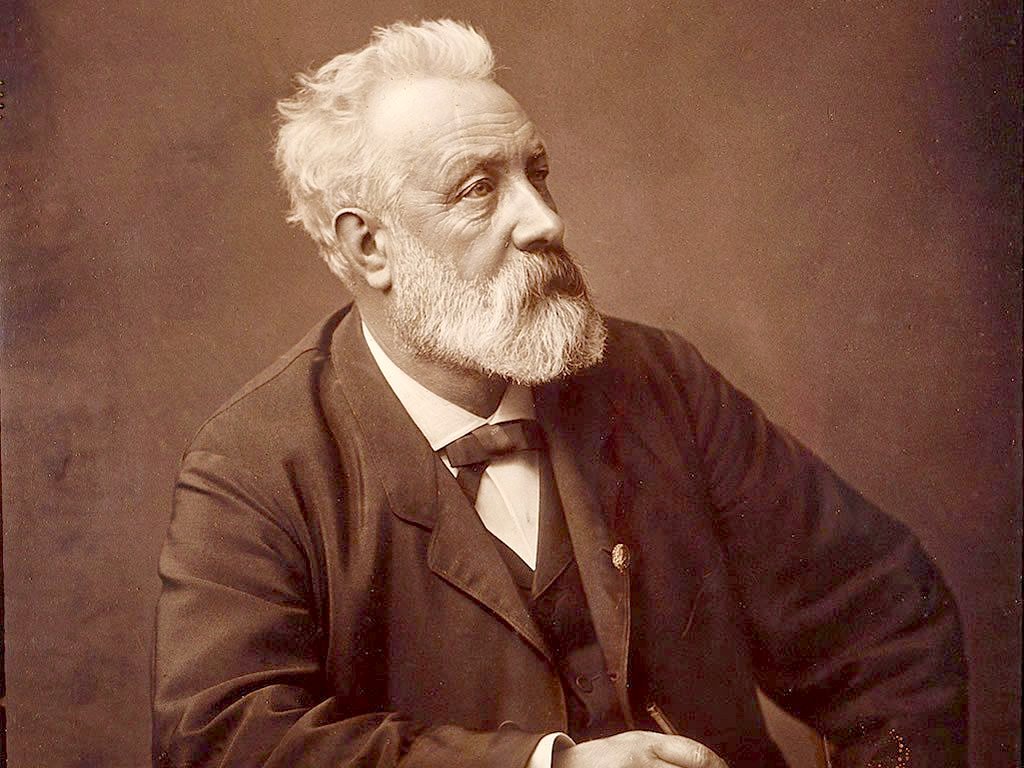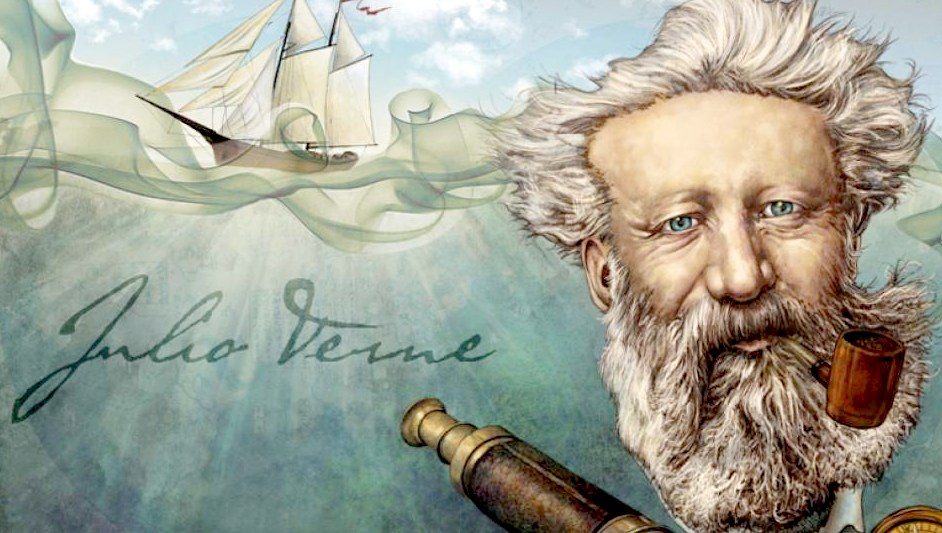|

What
a wonderful imagination the French writer had. He was also a practical
mariner, gaining much of his material from his travels, just like Herman
Melville, for his Moby
Dick. Jules Verne is best known for '20,000
Leagues Under the Sea' and Around
The World In Eighty Days. But he also authored a number of other
popular novels, that made it onto the big screen, such as 'The
Mysterious Island,' and 'Journey To The Centre Of The World.'
STUDIES
IN PARIS
In July 1848,
Jules Verne left Nantes again for Paris, where his father intended him to finish law studies and take up law as a profession. He obtained permission from his father to rent a furnished apartment at 24 Rue de l'Ancienne-Comédie, which he shared with Édouard Bonamy, another student of Nantes origin. (On his 1847 Paris visit, Verne had stayed at 2 Rue Thérèse, the house of his aunt Charuel, on the Butte Saint-Roch.)
Verne arrived in Paris during a time of political upheaval: the (2nd) French
or February Revolution of 1848. In February, Louis Philippe I had been overthrown and had fled; on 24 February, a provisional government of the French Second Republic took power, but political demonstrations continued, and social tension remained. In June, barricades went up in Paris, and the government sent Louis-Eugène Cavaignac to crush the insurrection. Verne entered the city shortly before the election of Louis-Napoléon Bonaparte as the first president of the Republic, a state of affairs that would last until the French coup of 1851. In a letter to his family, Verne described the bombarded state of the city after the recent June Days uprising but assured them that the anniversary of Bastille Day had gone by without any significant conflict.
Verne used his family connections to make an entrance into Paris society. His uncle Francisque de Chatêaubourg introduced him into literary salons, and Verne particularly frequented those of Mme de Barrère, a friend of his mother's. While continuing his law studies, he fed his passion for the theater, writing numerous plays. Verne later recalled: "I was greatly under the influence of Victor Hugo, indeed, very excited by reading and re-reading his works. At that time I could have recited by heart whole pages of Notre Dame de Paris, but it was his dramatic work that most influenced me." Another source of creative stimulation came from a neighbor: living on the same floor in the Rue de l'Ancienne-Comédie apartment house was a young composer, Aristide Hignard, with whom Verne soon became good friends, and Verne wrote several texts for Hignard to set as chansons.
During this period, Verne's letters to his parents primarily focused on expenses and on a suddenly appearing series of violent stomach cramps, the first of many he would suffer from during his life. (Modern scholars have hypothesized that he suffered from colitis; Verne believed the illness to have been inherited from his mother's side.) Rumors of an outbreak of cholera in March 1849 exacerbated these medical concerns. Yet another health problem would strike in 1851 when Verne suffered the first of four attacks of facial paralysis. These attacks, rather than being psychosomatic, were due to an inflammation in the middle ear, though this cause remained unknown to Verne during his life.
In the same year, Verne was required to enlist in the French military, but the sortition process spared him, to his great relief. He wrote to his father: "You should already know, dear papa, what I think of the military life, and of these domestic servants in livery. … You have to abandon all dignity to perform such
functions." Verne's strong antiwar sentiments, to the dismay of his father, would remain steadfast throughout his life.
Though writing profusely and frequenting the salons, Verne diligently pursued his law studies and graduated with a licence en droit in January 1851.
THE
FATHER OF SCIENCE FICTION
Jules Verne
hit his stride as a writer after meeting publisher Pierre-Jules Hetzel, who nurtured many of the works that would comprise the author's Voyages
Extraordinaires.
In all, Verne authored more than 60 books (most notably the 54 novels comprising the Voyages
Extraordinaires), as well as dozens of plays, short stories and librettos. He conjured hundreds of memorable characters and imagined countless innovations years before their time, including the
submarine, space travel, terrestrial flight and deep-sea exploration.

CLASSIC
WORKS - Jules Verne is best known for 20,000 leagues Under the Sea and
Around the World in Eighty Days, both of which became Hollywood
classics. Jules Verne was and still remains one of the best-renowned science fiction authors. His books were decades and even centuries ahead of their time, and while the initial reception to some of his books may have been muted they have nevertheless continued to amaze many as well as influence scientific discourse and debates. He remains unparalleled when it comes to science fiction and here are some of his top books.
Jules
Verne was the author of many adventure stories:
1
Twenty Thousand Leagues Under the Sea
2 Around the World in Eighty Days
3 Journey to the Center of the Earth
4 The Mysterious Island (Extraordinary Voyages #12)
5 From the Earth to the Moon
6 Michael Strogoff (Extraordinary Voyages, #14)
7 In Search of the
Castaways; or the Children of Captain Grant (Extraordinary Voyages, #5)
8 Five Weeks in a Balloon
9
Round the Moon (Extraordinary Voyages, #7)
10 Adrift in the
Pacific: Two Years Holiday (Extraordinary Voyages, #32)
11 The Master of the World (Extraordinary Voyages, #53)
12 The Adventures of Captain Hatteras
13 Les Tribulations d'un Chinois en Chine;
The Tribulations of a Chinese in China (Extraordinary Voyages, #19)
14 The Lighthouse at the End of the World
15 Mathias Sandorf (Extraordinary Voyages, #27)
16 Off On A Comet (Extraordinary Voyages, #15)
17 Los quinientos millones de la Begún (The five hundred million of the
Begún)
18 Facing the Flag (Extraordinary Voyages, #42)
19 Un capitán de quince años (A fifteen year old captain)
20 El Testamento de un excentrico (The Testament of an eccentric)
Many
people have used the eighty day target set by Jules Verne as the
goalposts for their technology projects having been inspired by the
famous French author. We are likewise enthused.
|

